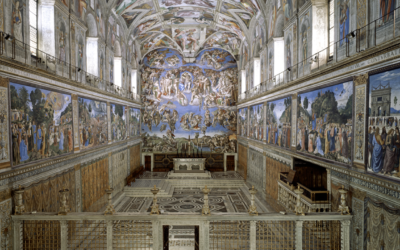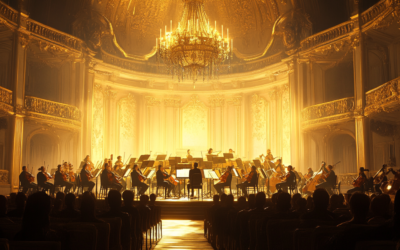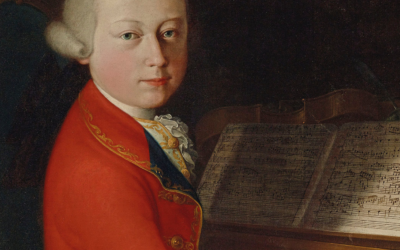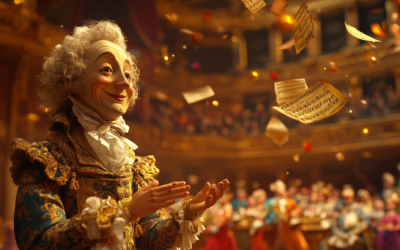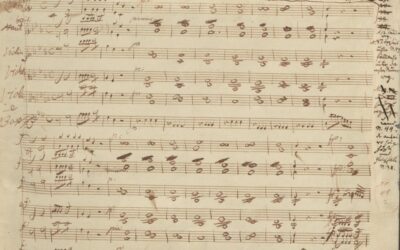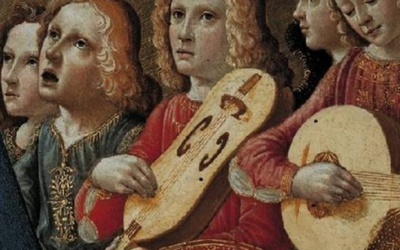Wolfgang Amadé Mozart
The Myth of Mozart's Childhood: Unmasking the Illusion
Mozart’s childhood is often romanticised, but behind the myth lies a more complex reality. This post explores the hidden dynamics within his family, questioning the traditional narrative of Mozart’s early years and shedding light on the forgotten role of his sister, Nannerl.
Mozart: The Fall of the Gods
This book offers a fresh and critical look at the life of Wolfgang Amadeus Mozart, challenging the myths that have surrounded him for centuries. We strip away the romanticised image of the “natural genius” and delve into the contradictions within Mozart’s extensive biographies. Backed by nearly 2,000 meticulously sourced citations, this work invites readers to explore a deeper, more complex understanding of Mozart. Perfect for those who wish to question the traditional narrative, this biography is a must-read for serious music lovers and historians.
“Mozart began to beat the keys on the harpsichord at three, play short pieces at four, and improvise Minuets at five. His father or sister copied the music that he was not yet able to compose. It is impossible to distinguish what actually came from his invention.”
Mozart: The Fall of the Gods
Mozart’s childhood is often shrouded in romanticised tales of prodigious talent and divine inspiration. Yet, when we look beyond the myths, a different picture begins to emerge—one that highlights contradictions and unspoken realities.
Born into a family where his father, Leopold, was a frustrated and unsuccessful composer, and his mother, Anna Maria, was of “Dinaric race” (as described by German nationalists), Wolfgang’s early years were shaped not by innate genius but by relentless familial expectations. Leopold’s ambition for fame found its outlet in his children, especially Wolfgang and his older sister Nannerl, who was also a talented musician, though her story has been largely overlooked.
Despite Nannerl’s early musical prowess, her contributions have faded into obscurity. Was she overshadowed by her younger brother, or simply a victim of the limitations placed on women in 18th-century society? Wolfgang himself once marvelled at one of her compositions, praising her talent, yet no trace of her work remains today. The focus on Mozart’s child prodigy image disregards the roles of those around him, particularly Nannerl, who may have played a significant part in shaping his development.
Mozart’s so-called “miraculous” early musical abilities were often exaggerated by biographers seeking to reinforce the myth of his genius. His father, keen to promote Wolfgang, carefully curated this image, often with the help of Nannerl, who would copy music that the young Mozart had yet to master. What remains unclear is how much of his early work was truly his own creation, and how much was a product of family collaboration.
You May Also Like
The Legend of Mozart’s Miserere
The enduring popularity of the narrative surrounding Mozart’s Miserere highlights the allure of the prodigy myth, but as we peel back the layers, we uncover a more nuanced picture of his life and the musical landscape of the time. The reality often contrasts sharply with the romanticized tales that have shaped our understanding of his genius.
Rediscovering Musical Roots: The World Premiere of Gasparini and Mysliveček
This December, history will come alive as the Camerata Rousseau unveils forgotten treasures by Quirino Gasparini and Josef Mysliveček. These premieres not only celebrate their artistry but also reveal the untold influence of Gasparini on Mozart’s Mitridate re di Ponto. A pivotal event for anyone passionate about rediscovering music history.
The Curious Case of Mozart’s Phantom Sonata
In a striking case of artistic misattribution, the Musikwissenschaft has rediscovered Mozart through a portrait, attributing a dubious composition to him based solely on a score’s presence. One has to wonder: is this music really Mozart’s, or just a figment of our collective imagination?
The Illusion of Canonic Mastery
This post explores the simplistic nature of Mozart’s Kyrie K.89, revealing the truth behind his early canonic compositions and their implications on his perceived genius.
The Unveiling of Symphony K.16
The Symphony No. 1 in E-flat major, K.16, attributed to young Wolfgang Mozart, reveals the complex truth behind his early compositions. Far from the prodigious work of an eight-year-old, it is instead a product of substantial parental intervention and musical simplification.
The Cibavit eos and Mozart’s Deceptive Legacy
The Cibavit eos serves as a striking reminder that Mozart’s legacy may be built on shaky foundations, questioning the very essence of his so-called genius.


